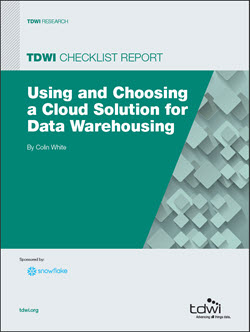
TDWI Checklist Report | Using and Choosing a Cloud Solution for Data Warehousing
July 27, 2015
Cloud computing is a hot topic and more organizations are using the
cloud for data warehousing. The cloud environment offers a pay-as-you-go, on-demand, and elastic scalability model that can provide
significant benefits for both the business and IT.
Compared to an on-premises IT environment, cloud computing
reduces up-front project costs and enables organizations to
scale their applications as required while paying only for the
resources they use. The cloud is, therefore, an ideal environment
for data warehousing projects given the large data volumes and
unpredictable nature of the analytic workloads involved.
Determining the data warehousing projects best suited to cloud-based
computing is not easy, especially given the significant
changes taking place in data warehousing. Companies are now
beginning to take advantage of new data sources, advances in
business analytics, and enhanced database technologies, and this
can require significant changes and upgrades to the data warehouse
architecture.
Organizations are also anxious that without proper management,
the cloud could simply become a way of bypassing IT bottlenecks
and budget constraints, which could lead to data warehousing
projects being deployed in the cloud that are not well suited to that
environment. Data proliferation, data security, poor quality data,
and inconsistent analytics results are also concerns if there is no
gatekeeper managing access to the cloud environment.
It is essential, therefore, that IT and business groups work together
to identify, develop, and manage those projects that can gain the
most from the business and technological advantages the cloud
offers for data warehousing and analytical processing.
Another challenge facing organizations moving to the cloud is
choosing the right platform for deploying and supporting data
warehousing as a service. A wide range of products and services
are offered by both traditional and start-up vendors. Selecting the
right vendor is difficult and careful evaluation is required before
committing to a particular vendor and service.
For organizations with existing data warehousing and business
intelligence systems, one potential barrier to successful cloud
adoption is the complexity of integrating the cloud and on-premises
systems so that data can be efficiently and rapidly moved into and
out of the cloud. For these companies, the ability to seamlessly
integrate cloud services into their existing data warehouse
environment is an important and critical requirement.
To address these concerns and help readers succeed in their cloud
data warehousing projects, this checklist identifies the benefits the
cloud offers, offers potential use cases, and presents key criteria for
using and choosing a cloud solution for data warehousing.